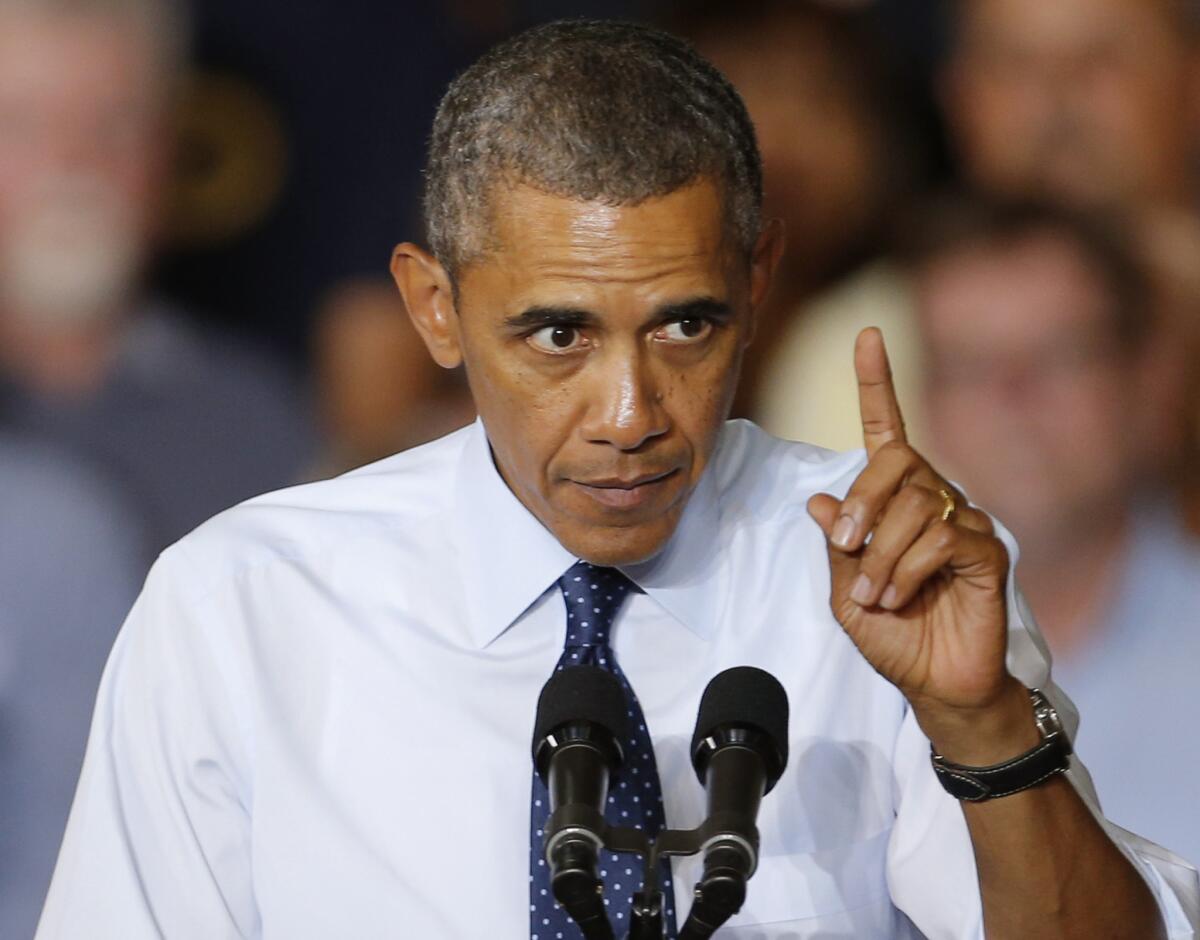What to look for when President Obama goes to the U.N.

- Share via
WASHINGTON -- President Obama travels Monday to New York for a meeting of the United Nations General Assembly, where he is scheduled to sit down with world leaders and U.N. Secretary-General Ban Ki-moon. He will also address the General Assembly, focusing on the challenges in the Middle East, including the use of chemical weapons in Syria, Iran’s nuclear ambitions and peace talks between Israelis and Palestinians.
Here’s a look at five things to watch for on the two-day trip:
Handshake Diplomacy: The most important interaction on the president’s visit may last minutes or even seconds between Obama and newly elected Iranian President Hassan Rouhani. Rouhani, considered more moderate than his predecessor, has signaled in recent days that he may be interested in negotiations to modify his country’s nuclear program to suit U.S. demands.
Obama has suggested he is open to direct talks over the issue, but aides hint strongly that he is more comfortable with opening talks that involve all the permanent members of the U.N. Security Council. If the two leaders do meet – and that isn’t a given – the likely scenario is an informal exchange of pleasantries or, simply, a handshake. National security officials are wary of a welcome that is too enthusiastic, before the new Iranian leader has a chance to demonstrate his commitment to dismantling the nuclear program. Obama will make decisions “based on their actions, not their words,” one senior administration official said.
Dual Syria Message: The Syrian government has submitted its first report describing its cache of chemical weapons, and international monitors haven’t dismissed it out of hand. U.S. officials are not yet convinced that President Bashar Assad will rid himself of all chemical weapons within a year, but they do hold out hope that the process of disarming might prevent more attacks.
Obama is eager to keep alive the threat of strikes if progress is not made, which means that this week he’ll be simultaneously making the case for military force while asking the international community to support efforts to reach a diplomatic solution. The Syrian conflict is expected to be a key component of his Tuesday morning address to the full assembly.
Middle East Peace: Obama is giving prime face time to the principal players in the talks over critical issues in the peace process starting this week, despite the slim prospects for a resolution. The president plans to meet Tuesday with Palestinian Authority President Mahmoud Abbas and has a session scheduled for Sept. 30 with Israeli Prime Minister Benjamin Netanyahu.
The annual U.N. sessions have been an awkward for Obama and Abbas in the past. Although the U.S. supports Palestinian statehood, the government’s position is that it can come only through direct talks with the Israelis. Thus, at last year’s U.N. session, Obama argued against an implicit recognition of Palestinian statehood by the world body.
Spies Like Us: Some U.S. allies and friends are still chafing over summer disclosures that they were targeted by sweeping surveillance programs run by the National Security Agency. The leaks caused so much distress in Brazil that President Dilma Rousseff recently decided to cancel a previously planned state visit to the U.S.
Rousseff is likely to run into Obama, her spurned host, just days after she asked him to clean up the NSA’s act before they talk about finding another date on their social calendars. She may even bring up her concerns about U.S.-based Internet networks while appearing at the U.N.
Visa Pending: The Sudanese president wanted for war crimes has threatened to show up at the world summit, setting off a controversy about whether he should be admitted to the summit or turned over to the International Criminal Court to face charges. Over the years, the U.S. government has called for Omar Hassan Ahmed Bashir to answer for the bloody conflict in Sudan’s Darfur region.
The U.S. ambassador to the U.N., Samantha Power, said last week that it would be more appropriate for Bashir to “present himself to the ICC and travel to The Hague” rather than to the assembly in New York City. Still, the U.S. is supposed to grant the visa requests of foreign leaders bound for the U.N. Obama administration officials have not said how they would respond if he chooses to attend.
ALSO:
Venezuela seizes another asset: Toilet paper factory
China court sentences former official Bo Xilai to life in prison
North Korea indefinitely postpones family reunions with SouthTwitter: @cparsons
More to Read
Sign up for Essential California
The most important California stories and recommendations in your inbox every morning.
You may occasionally receive promotional content from the Los Angeles Times.











